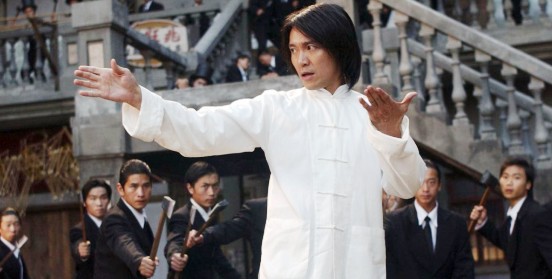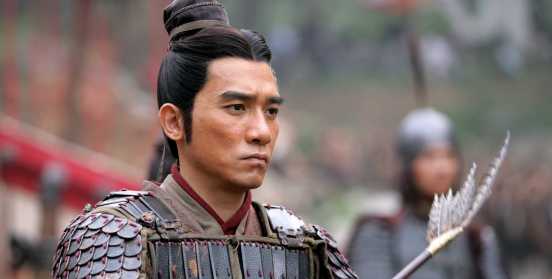December 27th, 2009
Calvin’s Top 10 Hong Kong Films of the Last Decade (7-5)
With the results of the LoveHKFilm.com reader’s poll slowly trickling out, I give you a few more of my personal top ten. Will they in any way reflect the choices of the readers? I have no idea. Let me know what you think!
7. Kung Fu Hustle (2004)

Stephen Chow is all out of bubblegum in Kung Fu Hustle
How great is this movie? Well, let me put it to you this way: Kung Fu Hustle is so great that comic genius-turned-filmmaker extraordinaire Stephen Chow can disappear for long stretches of the narrative, and I didn’t even miss him. Think about that for a second. The star of the film (and likely the singular reason why people bought tickets for the movie in the first place!) occasionally gives up screen time to lesser known actors in an A-budget picture. Sure, familiar faces like Yuen Wah and Shaolin Soccer alums Chan Kwok-Kwan and Lam Chi-Hung round out the supporting cast, but a lot of the story hinges on the performances of a bunch of relative unknowns — the residents of Pigsty Alley. During my first viewing, I found myself asking, “Who are these guys?” And better still, “Why am I so riveted to what’s happening to them?”
I guess it doesn’t hurt that “the hidden tigers” of Pigsty Alley are introduced with a martial arts sequence that is a good sight better than a lot of fights that conclude a number of major kung fu movies. Taken as a whole, Kung Fu Hustle is like a Chuck Jones-directed Looney Tunes cartoon cross-bred with every wuxia/kung fu film you’ve ever seen and sprinkled with a heavy dose of anachronistic pop culture references that enhance, rather than detract from the material. The score by Raymond Wong, which mixes new and classic songs perfectly, strikes the appropriate epic tone and is perhaps the best Hong Kong soundtrack I’ve heard since the glory days of the early 90s. The music is absolutely essential to the movie, particularly during the climax.
And how about that finale? When Stephen Chow returns to the narrative, he should not be able to glide right back into the role of protagonist so effortlessly. But not only does he accomplish that feat, but he goes one better — the man practically owns the movie and the audience. Who else can do that? Answer: nobody.
What I love most about the film is how Stephen Chow references the wuxia and kung fu films of yesteryear not as they really were, but as we remember them in our collective imagination. Kung Fu Hustle is the movie you were imagining in your head as a kid after you saw a really fun kung fu movie, kicking the air and vanquishing evildoers with one strike of your unstoppable Buddha’s palm technique. Kung Fu Hustle not only captures the essence of that feeling, but translates it perfectly to the big screen.
Of course, a hero is only as good as the villain (see Donnie Yen’s Flashpoint as a prime example of a complete failure to understand this truism), and it’s helpful that Leung Siu-Leung’s “Beast” is both a worthy adversary and the ultimate badass. Stephen Chow is no slouch either. Martial arts-wise, he may not be Bruce Lee, Jackie Chan, or Jet Li, but filmmaking-wise, he’s clearly their better. And it shows. “Wirework” and “CGI” are sometimes thought to be dirty words for hardcore action fans. But Chow and action director Yuen Woo Ping use those tools as enhancements, not cheats. The kinetic, visceral action on display provides all the necessary vicarious thrills, as the energy of that last extended fight is hard pressed to be matched by any fight sequence that came out in the “aughts.” To put it another way, the action in this movie > than any fight scene in any film with Donnie Yen as the lead. Yeah, I said it.
6. 2046 (2004)

Tony Leung Chiu-Wai gets all emo in 2046
Boy, how time can change a man’s opinion. I cannot emphasize how much I hated, hated, HATED 2046 when I first saw it. As a huge fan of In the Mood for Love, I was highly anticipating this companion piece/sequel when I first caught wind of it. Flash forward to when I finished watching it, and I was aghast. How could Wong Kar-Wai turn Chow Mo-Wan (Tony Leung Chiu-Wai) into such a sleazy douchebag? Why did he have to be so darn mean to my (former) beloved Zhang Ziyi? Why is Maggie Cheung barely in the movie?
It’s hard to remember what my critical evaluation of it was at the time, but I reckon it was something like this: 2046 was beautiful to look at, but was not only a betrayal of a major character (see Clarice in the novel Hannibal), but felt more like an irritatingly episodic rehash of Wong Kar-Wai’s pet themes than anything new. I was, to put it mildly, very disappointed.
So what happened? Well, a lot of things actually. I calmed down for starters. Later, I randomly happened to speak to someone who had a very different take on the movie, one which I strongly disagreed with, and yet, I was somewhat intrigued by that person’s interpretation. And then something else happened — I had a summer in Hawaii that felt like a Wong Kar-Wai movie all its own. And so, with these new experiences, I watched 2046 again — this time armed with the foreknowledge of what would happen in the story, but sans the baggage of what my hopes and expectations had been for the film. And guess what? I liked it.
Unlike Indiana Jones and the Kingdom of the Crystal Skull, repeated viewings of 2046 substantially altered my opinion of the film. I saw Chow Mo-Wan differently this time, as a haunted, broken man who is only honest, although brutally so with the clingy character played by Zhang Ziyi. This time around, I found it to be a poignant, heartwrenching depiction of lost love, never to be regained. And so now I could appreciate the callbacks to Days of Being Wild and In the Mood for Love, as they felt more purposeful and considerably less gimmicky.
In many ways, 2046 feels like Wong Kar-Wai’s swansong, summation, or perhaps a “Dear John” letter of sorts to the look, feel, and thematic content of his previous films. Never mind that he made the self-derivative and hollow, My Blueberry Nights, sometime thereafter. 2046 is the latest, but hopefully not last masterpiece from Wong Kar-Wai, a film that repays its viewer with multiple viewings. I don’t think you can say the same about crappily ” artsy” romances like Ming Ming…or can you?
5. Red Cliff (1 & 2)

Tony Leung Chiu-Wai is an avid Dynasty Warriors LARP-er
Should this movie be listed so high? Should this movie even be on this list? Honestly, I’m really conflicted. With that said, let me use this film as a way to talk about how difficult, unscientific, and somewhat arbitrary any “Best of” selection process can be. Red Cliff (Parts I and Deux counted as one film) was as low as #10 on this list, but upon further consideration, it got bumped all the way up to #5.
Why? Well, I think there are three somewhat interrelated reasons: 1) Considering the size, scope, and complexity of the picture, the fact that it even works is an astounding achievement in itself, 2) It’s one of the few highly-anticipated Hong Kong films that actually lived up to the hype, and 3) it’s John Woo’s long-awaited return to form, after a string of some not-so-good films he made for Hollywood (except Face/Off — I like it).
Sure, the first film essentially serves as the longest prologue in recent cinema history, but what a prologue it is! You can read my half-serious/half-tongue-in-cheek thoughts on that first film here. And let’s not forget that Part II actually delivers the goods. I love the Zhao Wei stuff in the enemy camp, the strategizing by Tony Leung and Takeshi Kaneshiro’s character, the requisite Woo-style male bonding, and the sheer spectacle of the battle scenes. There have been a lot of historical epics in the “aughts” – Battle of Wits, The Empress and the Warriors, Three Kingdoms: Resurrection of the Dragon, and even the very good Warlords — but none of them hold a candle to Red Cliff. Although some might think I should have left it off in favor of a cool Johnnie To crime thriller or (hell, I don’t know) Twins Effect 2, I think it’d be strange not to have a space reserved for Red Cliff on this list. After all, it’s probably the most impressive Hong Kong film of the last half of the decade. I mean, what would I replace it with, Kung Fu Cyborg: Metallic Attraction? Don’t friggin’ tempt me.
Next time: Chaste wuxia love, a needy couple, and the best HK sports movie ever made!


January 5th, 2010 at 8:05 pm
As much as I loved In The Mood For Love, it is 2046 that really captured my heart. It washed over me as a meditation on not only love (found,then lost), but also on memory and how memory (and regret) can torment and haunt you. As someone who wrote an entire novel on the power of memory and its hold on individuals, I experienced this film as a marvelous meditation on memory, regret, and lost love–with the added bonus of tremendous visuals and a soundtrack that made this film so much more than any film I had ever seen. If you have ever had your heart broken and been haunted by the power of memory, this is the film for you.
January 6th, 2010 at 12:43 am
Right on. I couldn’t have said it better, Marie.